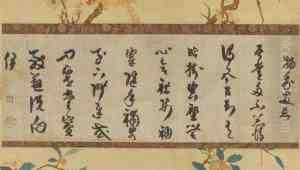Shuho Myocho Paintings
Shuho Myocho, also known as Daito Kokushi, was a prominent Japanese Zen Buddhist monk and the founder of Daitoku-ji, a major temple in the Rinzai sect of Zen Buddhism in Kyoto, Japan. Born in 1282 in the province of Harima, now part of Hyogo Prefecture, Myocho was ordained as a monk at a young age and embarked on a spiritual journey that would lead him to become one of the most influential Zen masters of his time.
Myocho initially studied Tendai Buddhism on Mount Hiei, the headquarters of the Tendai sect, but he eventually became disillusioned with its teachings and practices. Seeking a more direct experience of enlightenment, he turned to Zen Buddhism and studied under several noted Zen masters including Kian Soen, Issan Ichinei, and Nampo Jomyo. Myocho's dedication to the rigorous Zen practice and his deep insight into the nature of mind and reality soon led him to become a highly respected teacher in his own right.
In 1319, after receiving the acknowledgment of his enlightenment from his teacher Nampo Jomyo, Myocho went on a pilgrimage to various Zen monasteries across Japan, deepening his understanding and refining his teachings. It was during this period that he took the name Daito Kokushi, with 'Daito' being a reference to the 'Great Light' of enlightenment and 'Kokushi' meaning 'national teacher'.
Myocho's reputation as a Zen master grew, and in 1325, he was invited by the shogunate to become the abbot of Kencho-ji in Kamakura. However, his most significant contribution came with the establishment of Daitoku-ji temple in 1325, which was originally a small hermitage. Daitoku-ji became a center for Rinzai Zen practice and education under his leadership, emphasizing zazen (seated meditation), koan study (a form of Zen training using paradoxical questions or statements), and personal encounters between master and student to awaken one's inherent Buddha-nature.
Daito Kokushi's influence extended beyond the monastery walls; his teachings attracted the attention of the political elite, including members of the imperial family and the shogunate. Despite his connections with the powerful, he maintained a simple and austere lifestyle, focused on the essence of Zen practice.
Shuho Myocho passed away in 1337, leaving behind a legacy that would influence the development of Zen Buddhism in Japan profoundly. His disciples continued his teachings, and Daitoku-ji remains an important Zen temple to this day, with many sub-temples and a rich cultural heritage, including a vast collection of art and calligraphy associated with the Zen tradition.
